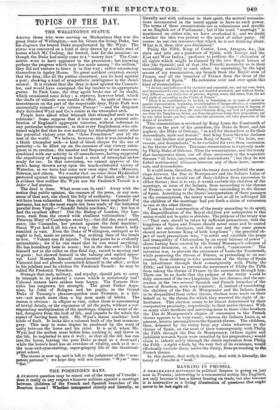THE FORBIDDEN BANS.
A ottitions question may be raised out of the treaty of Utrecht : does it really in any respect whatever militate against a marriage between children of the French and Spanish branches of the Bourbon house t Whether interpreted strictly and literally, or
Philip the Fifth, King of Castile, Leon, Arragon, &e., [his style and title are a gazetteer of Spain, with Europe and the East and West Indies,] professes to perform the " abdication of all rights which might be claimed by the two Royal houses of this [the Spanish] and of that [the French] monarchy as to their succeeding mutually to each other; by separating, by the legal means of my renunciation, my branch from the Royal stem of France, and all the branches of France from the stem of the blood Royal of Spain." He reiterates over and over again this kind of renunciation- " I declare, and hold myself for excluded and separated, me, and my sons, heirs, and descendants for ever, for excluded and disabled absolutely, and without limita- tion, difference, and distinction of persons, degrees, sexes, and times, from the act and right of succeeding to the Crown of France."
"There is no consideration to be bad, or foundation to be made of active or passive representation, beginning, or continuation of lineage effective, or contentive of substance, blood or quality; nor can the descent, or computation of degrees of those persons be derived from the most Christian king, my lord and grandfather, nor from the Dauphin my father, nor from the glorious kings their progenitors; nor by any other means can they come into the succession, nor take possession of the degree of proximity."
This renunciation is reechoed by King Louis the Fourteenth of France on the part of his grandson, the Duke de Berri, and his nephew, the Duke of Orleans, "as well for themselves as for their descendants, male and female." And King Louis likewise declares "his said brother and grandson King of Spain," "his heirs, suc- cessors, and descendants," to be excluded for ever from succession to the throne of France. The same renunciation is expressly made by Philip Duke of Orleans. Thus the renunciations, and the treaty that incorporates them, cut off from succession to the respective thrones "all heirs successors' and descendants " ; but they do not forbid matrimonial alliances between any of those heirs, succes- sors, and descendants.
It would seem, therefore, that the treaty does not forbid the mar- riage between the Due de Montpensier and the Infanta Luisa of Spain, but that it would cut off their children from succession to either throne ; that is to say, it would exclude the children of the marriage, as issue of the Infanta, from succeeding to the throne of France,—as issue of the Duke, from succeeding. to the throne of Spain. According to the literal interpretation of these passages in the renunciations, the treaty would not at all be infringed till the children of the marriage had put forth a claim of succession to one or the other throne.
U n a liberal construction of the treaty according to its spirit,
the • ualification of the Royal children yet unbegotten to this union would not be quite so absolute. The purpose of the treaty was —"That care should be taken by sufficient precautions' that the kingdoms of Spain and France should never come and be united under the same dominion, and that one and the same person should never become King of both kingdoms " ; the practical ob- ject of such precautions was "to settle and establish the peace and tranquillity of Christendom by an a balance of power" ,• alarm baying been created by the Grand Monarque's schemes of universal dominion, or, as it is now called, "annexation." The intention was, to prevent the successors of Louis the Fourteenth, while possessing the throne of France, or pretending to its suc- cession, from claiming to take possession of the throne of Spain by inheritance through their consanguinity with Philip the Fifth; and likewise to prevent the !successors of Philip the Fifth from taking the throne of France by the succession through him. There can be no doubt that the purpose of the treaty would be fully answered if the two kingdoms' the two thrones, and the suc- cession in the two several Spanish and French branches of the house of Bourbon, were kept separate ; if, instead of considering the children of the Due de Montpensier and the Infanta Luisa to be disqualified from either throne, election were made on their behalf as to the throne for which they reserved the right of in- heritance. This election seems to be almost determined by their comparative proximity, respectively, to their native thrones. With so many elder brothers and surviving issue to those elder brothers. the Duc de Montpensier's chance of succession to the French throne appears to be verysmall; whereas the Infanta Luisa is, at present, heiress presumptive to the Spanish throne. The children, then, debarred by the treaty from any claim whatever to the throne of Spain, on the score of their consanguinity with Philip the Fifth through the Duc de Montpensier, (whose rights and liabilities towards Spain were annulled by his progenitors,) would claim to inherit solely through the direct succession from Philip the Fifth : a right which, by the very fact of its existence, would effectually exclude them, under the treaty, from pretending to the French throne.
In this matter, deal with it literally, deal with it liberally, the treaty of Utrecht is "bosh."


























 Previous page
Previous page